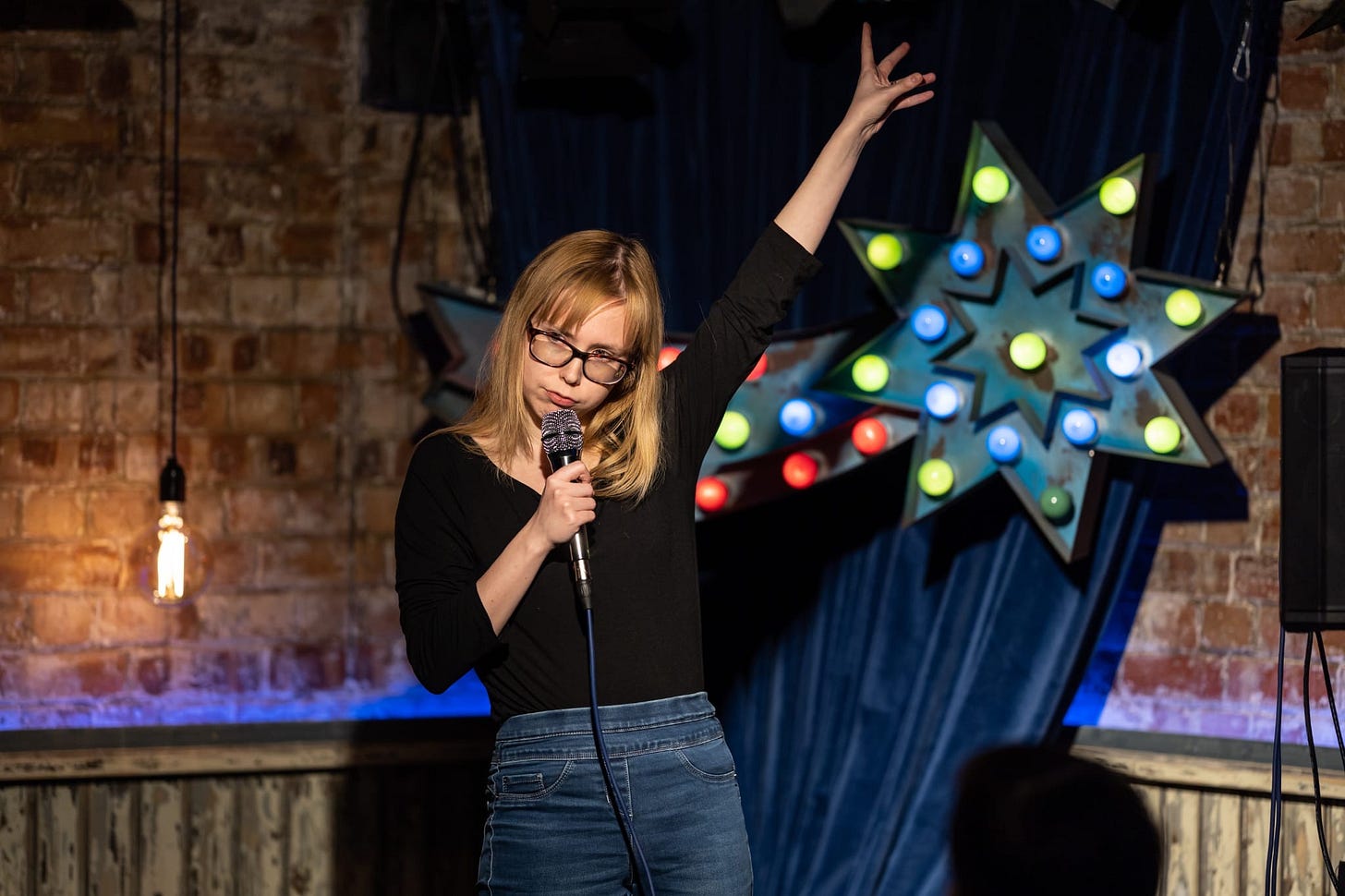‘A Kafka-esque slap in the face’: Annabel Edmonds on predatory men tolerated by the stand-up comedy scene
A brilliant new podcast, Punorama Investigates, looks at stand-up comedy and the men who really need to no longer be in it
I first met writer and comedian Annabel Edmonds in late 2022, at an open mic night at The Caxton Arms. I asked her to perform at the very first night I put on in Brighton1, at The Pipeline. She was great, very funny, and very gracious about me getting her bloody name wrong on the poster.
Annabel doesn’t do stand-up any more, in part due to the sexual harassment she experienced.
I interviewed her about her brilliant new podcast, two episodes of which deal with this most underreported and unacknowledged topics: predatory men in stand-up comedy.
The podcast, Punorama Investigates, is brilliant - a both funny and insightful look at politics, patriarchy, the general state of things. And yes, it contains plenty of puns.
Go away and subscribe to it immediately. Then come back here, and read the interview below.
Trigger warning: article contains references to sexual harassment and sexual misconduct.
Who are you, and why am I talking to you?
I’m Annabel. I’ve done a podcast, and I am so thrilled and pleased that people have liked it, and been kind about it.
And I have taken that praise, and it has made my head enormous. So I want to talk about it and promote it even more.
How did the podcast happen?
It started as a plan for Edinburgh Fringe. I had a plan to do a show called The Daily Show (No, Not That One).
Nice.
[The plan was] Every day I would do a completely new, political show. Ten minutes of the news yesterday, some jokes about that. Then a half an hour deep dive on a topic, and then maybe twenty minutes of improv.
But then I had a meeting with the lovely Dec Munro. I have Long Covid, so I have issues with fatigue, and health, and my health being unreliable…
And Dec said, “this is a great idea, but this should be a podcast”.
I then spent the next nine months trying, essentially, to put the first episode together, which is on prison reform.
I got the fabulous Rubia Sinha-Roy to do the artwork, then talked to various sound people as I needed someone better than me to do the sound.
I landed on lovely sound wizard Emma Millen, who is also a presenter, podcaster, and audio person in her own right. The show would be dogshit without her!
The podcast is topics that I’m really interested in, trying to do a deep dive in fifteen minutes. It’s interesting and engaging but not too preachy.
But it’s also fact-based. It’s sourced. It’s “here what I think about things”, but also here’s what some proper journalists think.
It’s clearly very well researched! Have you recorded a bunch so you can release them week by week?
Yes. I’m ahead, but not by that much. I don’t want events to overtake me, essentially.
Are you a person who has always really liked podcasts, or was it more a case of the idea suiting the format?
This is going to sound wanky, but I love sounds. I love good noises. Even on a TV show a good noise will be important to me. Like Matt Berry’s pronunciation of things, for example.
I love a good podcast, things like Who Did A Shit On My Floor At My Wedding, and My Dad Wrote A Porno. And I write for The Skewer, which I think is brilliant.
So yes, I like podcasts, but I like noise in general [laughs].
So on the one hand I’m very very angry, but on the other hand I’m very very stupid. I do just like a funny noise.
That’s a good combination - so it’s highbrow AND lowbrow.
I would say so.
Not putting words into your mouth.
Any clever words, put them into my mouth please.
How many episodes are you going to do?
We’re going to do eight episodes for season one, then have an eight week break, then the plan is another eight episodes for season two.
That is because this podcast is taking over my life and I need the break.
They do that!
The prison reform story took me ages, whereas predatory men in stand-up comedy, I… have access to all that information already.
For an example of how it works, I want to do an episode on PIP (Personal Independence Payments).
I volunteer for a mental health charity, and we are getting a huge amount of callers who are devastated and distressed.
It’s a story that’s really important to me, but also I’m not an economist. I feel I need to do quite a lot of research before making a story I’m happy with.
I want to offer a bit more insight than just “Labour are terrible”. I mean, Labour are terrible, but here’s why, and here’s the impact.
And also try to find some jokes to put in.
How did you get into comedy?
During lockdown, I did the Angel beginners course, which was on Zoom. I’d always wanted to do stand-up but I had always been too scared to go on stage, so thank you Covid! Viggo Venn was on my course…
Then I did standup for ages, then did improv for the first time, and loved it. Then started writing for the Radio 4 open door shows and loved that. And went on a sitcom writing course and wrote three sitcoms - obviously none of them have been made.2
The world of comedy has really branched out for me beyond stand-up. So though I’m really sad I’m no longer doing it, I’ve not left the comedy world behind. I’m very much in it.
Which brings us on to one of the reasons you left stand-up specifically. You’ve done two very powerful episodes about predatory men in that world.
The main difficulty I have here is not just regurgitating what I said in the episode.
I would say that sexual misconduct is like butter applied by a toddler, in that it’s everywhere but not spread evenly.
So I don’t want to dismiss sexual misconduct happening in other places, but to me stand-up has a particular problem in that there is no system for getting rid of it.
There are some heroes in stand-up comedy who have stood up and said, “this is what’s happened to me”, and have made people aware.
There are terrible people who are the ones doing the sexual misconduct and sexual harassment and above.
Most people are somewhere in the middle. And it’s not reasonable to shame people because they’re not choosing to be heroes for something they do as a hobby twice a week in a pub in Hove for no money.
But what I am saying is, 99% of us don’t like this. I’ve obviously left the stand-up world and slammed the door on the way out, but I know plenty of women who have quietly left or quietly done fewer and fewer gigs. Women who I think are brilliant.
And stand-up is a craft, right? So the less stage time you get… if you want to act in solidarity and say “I’m not doing that gig”, you’re hurting yourself.
We’re hurting the stand-up ecosystem, and stand-up is an art form that I love. So we need to get organised. We can get these people out!
It’s similar to how America talks about gun control. Whenever there’s a terrible shooting it’s all, “what can we possibly do?” And it’s like… look at the rest of the fucking world mate.
There are things that can be done. I contrast it [on the podcast] with the mental health helpline, where I also get sexually harassed a lot. But that feels very different because there’s acknowledgement, there’s a proper system, there’s support, and there’s joined-up information sharing.
There needs to be a system, and there needs to be accountability.
It’s almost like needing some kind of stand-up union…
Yep.
The information I tend to get is from groups with names like “non-evil promoters”, which can be quite bleak because a lot of it is who not to book. When I was at The Guardian, I had my union, and if something was going on I could go and talk to them about it. Or, if I was a complete idiot, HR…
I will say, one of the bleakest things I’ve thought since leaving my previous job and going into comedy was, “I really miss HR”!
I’m going to be annoying and say I don’t necessarily have the solutions. And I think it’s maybe for other people to figure out! I’ve done a lot of work…
I agree there needs to be regulation in some form. There needs to be support in some form. Training in some form. Information-sharing in a regulated, systemic way.
It’s not necessarily for me to say in what form those come. Of course I’m anti-capitalist, while sitting here deeply middle class, so [a] union is my preferred option. But I’m not going to sit here and say that’s the only way forward.
I’d also say don’t underestimate the power of those WhatsApp and Facebook groups. Those are my lifeline for finding out things.
If there was another woman on [the bill] - which was not always the case - we would swap information.
That was it. How outrageous that right before I’m going on stage, whacking on a fake moustache and playing with stupid hats, I was having to go “oh, who’s your local rapist?”.
I’m saying, here are the things that should be part of the solution. I’ve now left stand-up. Guys… crack on without me.
The podcast focuses on the Brighton scene, but obviously this is more of a universal issue.
I think Brighton deals with this better than most. I used to gig mostly in London. Brighton generally has nicer promoters; there was more of a community, so I heard about things more than I did in London. There are frequent rape jokes in London. Frequently I’d be the only female comedian on the bill. That’s very rare in Brighton. So as much as things are bleak in Brighton, it’s one of the better ones…
All the regular Brighton promoters still put a lot of these guys on all the time, though…
I agree, and that’s terrible. Not to defend them, but when I say to a promoter “I would like to not be on a gig with this person”, I’m getting no pushback.
The bar is so low. Whereas in London, I don’t feel able to have those conversation with those promoters.
With sketch comedy nights, and improv as well, it feels like these rely a lot more on a group dynamic to work. And obviously there are still problems in those worlds. But it seems a bit easier to manage than stand-up.
There are different cultures, but there are also different systems. For example, I work a lot with Hoopla Impro, based out of London Bridge, who I absolutely love…
Shout out to Hoopla3.
If I had a problem with someone, I could speak to my [improv] group, which as you say relies on teamwork and there’s an ethos of consent, and we talk about boundaries and what is everyone comfortable with.
It’s not like if I leave the group, other people get more stage time. There’s no benefit to the group falling apart. However, say that doesn’t work, I know exactly who in Hoopla I go to.
If I had a problem with a Brighton stand-up, who do I go to? As I mention in the podcast, I’ve come across - either performing at or going to - nineteen different promoters, some of which, by the way, are these predators. So how do I get someone out of the Brighton comedy scene? I just don’t know the process.
You have to put your trust that there is some structure, and that they’ve written down what you’re supposed to do, and if this doesn’t work, then this is what happens… which we don’t really have in the stand-up scene.
Often what we have got written down in stand-up is, “we have a zero-tolerance policy towards sexual misconduct”. And that feels like a Kafka-esque slap in the face.
It is less than worthless. It’s just failing to acknowledge anything that’s going on.
You don’t need that. You need to say actually, these people are going to get in. Let’s be realistic about this, these motherfuckers are getting in. It’s about the process of getting them out.
Perfect isn’t a reasonable standard to hold ourselves to.
There’s also this misconception with sexual harassment and sexual misconduct that these are easily identifiable monsters.
Actually, it’s incredibly common. Men who seem like nice guys also sexually harass women. There’s one guy on the Brighton scene - I won’t say the name, but you know the name I mean - he was my friend. I got on very well with him and I didn’t see the accusations coming at all.
And they are heartbreaking. Obviously the victim is the one that’s suffered the most, and I absolutely applaud her bravery for coming forward. And it cost her, emotionally and career wise it cost her.
But it’s like poison that spreads out. Even if you’re not the one victimised, it affects you.
It breaks your heart.
What can we expect from the next episode of the podcast?
One of the things that people have said to me, which is so kind, is “don’t you have a lovely radio voice”.
You do! I said that.
You have. And what I’ve immediately done, James, is throw that compliment back in your face, because the next episode is about regional accent bias.
And how I and people with this voice - which I hate listening to when I listen back - but I have been unfairly advantaged by it.
So thank you everyone for those lovely compliments, but I am going to throw them back in your face.
I talk a lot about Would I Lie To You, and how I’m so annoyed that David Mitchell has the reputation of being the clever one when Lee Mack is carrying that show.
You read one David Mitchell column, and that defenestrates the idea that he’s clever.
I don’t like to stray too far from controversy, so I’m also doing an episode on women’s only spaces.
And don’t worry, I’m not revealing myself as a massive TERF.
Traditionally women’s only spaces are really important to me. However, the debate around them has been taken over by TERFs claiming that trans women are a problem. They’re absolutely, 100% not. Trans women are women, solidarity with my trans sisters.
The problem with women’s only spaces is the gutting of funding we are receiving from austerity cuts, and austerity 2.0 which is happening.4
Women can’t get into refuges when they need them because the funding has been slashed, but you wouldn’t know that from any major newspaper. Because they are relentlessly writing “trans women: are they predators??” clickbait.
We’re not talking about the real issues with women’s only spaces, but I don’t want to use trans women as a bait and hook. I want to be very upfront about being very pro trans women accessing those spaces and try to move the debate into what’s actually going on.
Let’s wind down with a quick fire round, as you do improv. Favourite shape?
Triangle.
Favourite chocolate?
Choc… something. They make it just down the road from me and it’s got salted caramel in it.
Favourite TV comedy when growing up?
The Daily Show with John Stewart! I used to watch it with my parents when we lived in Detroit. And now he’s back!
It’s so weird that he’s back.
Do you think American comedy culture overly influenced you, then, compared to the British one?
I don’t like the word “overly” [laughs].
I’m so leading with my questions.
But yes. I’m very much influenced by the Americans. My dream job would be to be John Oliver!
We don’t have the same tradition of the late night, ten minute monologue. Obviously The Mash Report did things like this, Frankie Boyle did something similar. But we don’t have the same tradition.
I’m very much influenced by that vein: here’s a clear perspective on something, that’s not a topical panel show, or two centrist men chatting for three hours.
Thanks, Annabel!
Punorama Investigates… is available on Spotify, Apple Podcasts, and all reputable podcast providers.
Annabel is on Instagram @annabel_edmonds_comedy
A night that was to become This Machine Kills Wasps. Still tickets available for Friday, by the way.
Yet!
Full disclosure: I also run nights at Hoopla… but I had no idea she was going to mention them.
Austerity never stopped, despite about four different PMs announcing its end over the last few years, and the majority of the press just going along with the idea.






